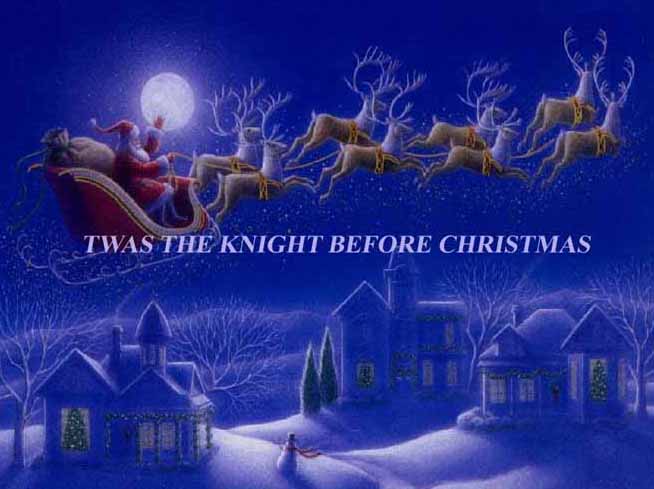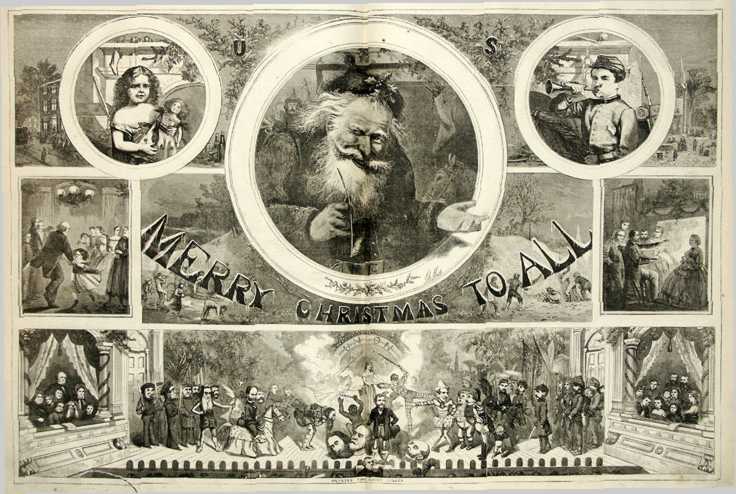Christmas In Verse
Voices in the Mist
By Alfred, Lord Tennyson (1809-1892)
The time draws near the birth of Christ:
The moon is hid; the night is still;
The Christmas bells from hill to hill
Answer each other in the mist.Four voices of four hamlets round,
From far and near, on mead and moor,
Swell out and fail, as if a door
Were shut between me and the sound:Each voice four changes on the wind,
That now dilate, and now decrease,
Peace and goodwill, goodwill and peace,
Peace and goodwill, to all mankind.
***
A Hymn on the Nativity of My Saviour
By Ben Jonson (1573-1637)I sing the birth was born tonight,
The Author both of life and light;
The angels so did sound it.
And like the ravished shepherds said,
Who saw the light and were afraid,
Yet searched, and true they found it.
***
Heigh Ho, The Holly
By William Shakespeare
(from As You Like It, 2.7.181-201)Blow, blow, thou winter wind,
Thou art not so unkind
As man's ingratitude;
Thy tooth is not so keen,
Because thou art not seen,
Although thy breath be rude.
Heigh ho, sing heigh ho, unto the green holly;
most friendship is feigning, most loving mere folly:
Then, heigh ho, the holly!
This life is most jolly.Freeze, freeze, thou bitter sky,
That dost not bite so nigh.
As benefits forgot:
Though thou the waters warp,
Thy sting is not so sharp
As friend remember'd not.
Heigh ho, sing heigh ho, unto the green holly:
most friendship is feigning, most loving mere folly:
Then, heigh ho, the holly!
This life is most jolly.
Alfred Deller performs the song sung by Feste in Shakespeare’s Twelfth Night***
A Christmas Carol
By Christina Georgina Rossetti (1830-1894)
First published in Scribner’s Monthly, January 1872In the bleak mid-winter
Frosty wind made moan,
Earth stood hard as iron,
Water like a stone;
Snow had fallen, snow on snow,
Snow on snow,
In the bleak mid-winter
Long ago.Our God, heaven cannot hold Him,
Nor earth sustain
Heaven and earth shall flee away
When He comes to reign:
In the bleak mid-winter
A stable-place sufficed
The Lord God Almighty
Jesus Christ.Enough for Him whom cherubim
Worship night and day,
A breastful of milk
And a mangerful of hay;
Enough for Him whom angels
Fall down before,
The ox and ass and camel
Which adore.Angels and archangels
May have gathered there,
Cherubim and seraphim
Thronged the air,
But only His mother
In her maiden bliss
Worshipped the Beloved
With a kiss.What can I give Him,
Poor as I am?
If I were a shepherd
I would bring a lamb;
If I were a wise man
I would do my part, -
Yet what I can, I give Him,
Give my heart.
‘In the Bleak Midwinter,’ the Gustav Holst arrangement, performed by the Choir of King’s College Cambridge in 2005.***
The True Christmas
By Henry Vaughan (1678)
(One of the major Metaphysical Poets, Henry Vaughan was born in 1621 in Newton-upon-Usk in Breconshire, Wales. In 1638 he entered Oxford University with his brother Thomas, who gained fame as a hermetic philosopher and alchemist. In 1640 Vaughan left Oxford to study law in London for two years. In 1646 his first book, Poems with the Tenth Satire of Juvenal English, was published, followed in 1650 by the first part of his most influential work, Silex Scintillans, a collection of religious poems. Silex Scintillans, translated as “The Fiery Flint” or “The Flashing Flint,” “refers to the stony hardness of his heart, from which divine steel strikes fire.” Vaughan died on April 23, 1695.)So stick up ivy and the bays,
And then restore the heathen ways.
Green will remind you of the spring,
Though this great day denies the thing.
And mortifies the earth and all
But your wild revels, and loose hall.
Could you wear flowers, and roses strow
Blushing upon your breasts’ warm snow,
That very dress your lightness will
Rebuke, and wither at the ill.
The brightness of this day we owe
Not unto music, masque, nor show:
Nor gallant furniture, nor plate;
But to the manger’s mean estate.
His life while here, as well as birth,
Was but a check to pomp and mirth;
And all man’s greatness you may see
Condemned by His humility.
Then leave your open house and noise,
To welcome Him with holy joys,
And the poor shepherd’s watchfulness:
Whom light and hymns from heaven did bless.
What you abound with, cast abroad
To those that want, and ease your load.
Who empties thus, will bring more in;
But riot is both loss and sin.
Dress finely what comes not in sight,
And then you keep your Christmas right.***
Our Joyful'st Feast
By George Wither (1588-1667)Lo, now is come our joyful'st feast!
Let every man be jolly,
Each room with ivy leaves is dressed,
And every post with holly.
Now all our neighbors' chimneys smoke,
And Christmas blocks are burning;
Their ovens they with baked meats choke
And all their spits are turning.
Without the door let sorrow lie,
And if, for cold, it hap to die,
We'll bury it in a Christmas pie,
And evermore be merry.
***
Illustration by Thomas Nast published in Harper’s Weekly, 1865, with Santa Claus surrounded by smaller images showing the typical Christmas traditions of the 1860s.Christmas in the Olden Time
By Walter Scott (1771-1832)On Christmas-eve the bells were rung;
The damsel donned her kirtle sheen;
The hall was dressed with holly green;
Forth to the wood did merry men go,
To gather in the mistletoe.
Thus opened wide the baron hall
To vassal, tenant, serf and all;Power laid his rod of rule aside
And ceremony doffed his pride.
The heir, with roses in his shoes,
That night might village partner choose;
The lord, underogating, share
The vulgar game of "Post and Pair."
All hailed, with uncontrolled delight,
And general voice, the happy night
That to the cottage, as the crown,
Brought tidings of salvation down.The fire, with well-dried logs supplied,
Went roaring up the chimney wide;
The huge hall-table's oaken face,
Scrubbed till it shone, the day to grace,
Bore then upon its massive board
No mark to part the squire and lord.
Then was brought in the lusty brawn
By old blue-coated serving man;
Then the grim boar's head frowned on high,
Crested with bays and rosemary.Well can the green-garbed ranger tell
How, when and where the monster fell;
What dogs before his death he tore,
And all the baitings of the boar.
The wassal round, in good brown bowls,
Garnished with ribbons, blithely trowls.
There the huge sirloin reeked: hard by
Plum-porridge stood, and Christmas pye;
Nor failed old Scotland to produce,
At such high-tide, her savory goose.Then came the merry maskers in,
And carols roared with blithesome din.
If unmelodious was the song,
It was a hearty note, and strong;
Who lists may in their murmuring see
Traces of ancient mystery;
White shirts supplied the masquerade,
And smutted cheeks the visors made;
But O, wht maskers richly dight,
Can boast of bosoms half so light!
Frank Sinatra with Fred Waring & His Pennsylvanians, ‘An Old-Fashioned Christmas,’ written by Sammy Cahn and Jimmy Van Heusen, produced by Sonny Burke, arranged by Nelson Riddle, featured on the 1964 album, 12 Songs of Christmas.
Founder/Publisher/Editor: David McGee
Contributing Editors: Billy Altman, Laura Fissinger, Christopher Hill, Derk Richardson
Logo Design: John Mendelsohn (www.johnmendelsohn.com)
Website Design: Kieran McGee (www.kieranmcgee.com)
Staff Photographers: Audrey Harrod (Louisville, KY; www.flickr.com/audreyharrod), Alicia Zappier (New York)
E-mail: thebluegrassspecial@gmail.com
Mailing Address: David McGee, 201 W. 85 St.—5B, New York, NY 10024





